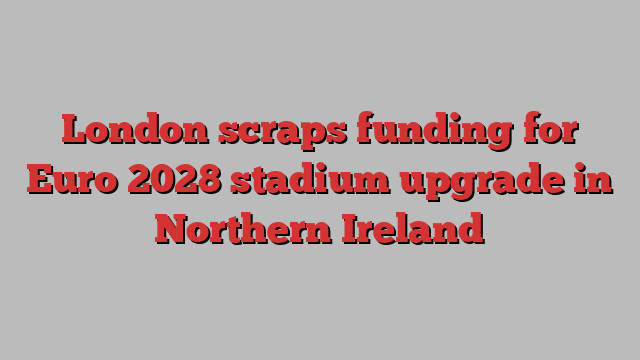
Unlock the Editor’s Digest for free
Roula Khalaf, Editor of the FT, selects her favourite stories in this weekly newsletter.
The UK government has “regrettably” pulled the plug on Euro 2028 soccer matches being played in Northern Ireland after saying the cost of upgrading a Belfast stadium had spiralled to “potentially over £400mn”.
Five matches were due to have been played at a redeveloped Casement Park, now a derelict Gaelic games stadium, under a UK-Irish bid to host the tournament secured last October.
The UK government had promised to help fund the upgrade but Northern Ireland secretary Hilary Benn said in a letter to the region’s communities minister Gordon Lyons that building costs had risen “dramatically” from £180mn when the bid was won “to potentially over £400mn” now.
“Having sought expert advice and analysis, we have concluded that there is a significant risk that the stadium would not be built in time,” he added in the letter, released late on Friday.
“This has been a very difficult decision to make, given our belief in the Euro 2028 partnership, but it is the only way forward in the circumstances.”
The only funds confirmed for the project were £62.5mn from the Northern Ireland executive, £15mn from the Gaelic Athletic Association and €50mn from the Irish government.
Former Conservative prime minister Rishi Sunak had vowed to provide “significant” — but unspecified — funding.
The new Labour government is already under pressure over budgetary choices including axing winter fuel payments for 10mn pensioners.
Sue Gray, chief of staff to Prime Minister Sir Keir Starmer, was reported to have taken an interest in the Belfast project having previously worked at a senior level in the Northern Ireland civil service.
First Minister Michelle O’Neill said: “The decision not to proceed . . . is deeply disappointing and a missed opportunity not only for local sport, but for our economy.”
She described as “cynical” that the announcement came on the day Westminster paused “transformational” City Deal regeneration projects.
Casement Park — a hurling, Gaelic football and camogie stadium in West Belfast named after an Irish nationalist hero — was already a contentious choice in a region where community divisions remain deep.
The region’s power-sharing executive has committed to funding stadiums for three main traditions — football, rugby and Gaelic — after a plan collapsed to build a shared site on the grounds of the former Maze prison.
The region’s main football stadium Windsor Park is too small to host the Euros.
“This was a unique opportunity to create jobs, boost tourism, and showcase our island’s sporting talent on the global stage,” O’Neill said.
Economy minister Conor Murphy had said hosting Euro matches at Casement Park could have given a £100mn boost to the local economy. Northern Ireland is one of the poorest parts of the UK.
“We will continue to work with the GAA, our local executive and the two governments to push this project forward and get these state of the art facilities built and a first-class stadium for Gaelic games delivered,” O’Neill said
Uefa did not make an immediate comment.
In a statement reported by the BBC, Ulster GAA called the announcement “bitterly disappointing”.
Tournament organisers the UK and Ireland 2028 Partnership said it would continue to work with partners and Uefa “regarding Northern Ireland’s involvement in the tournament”.
Gary McAllister, a spokesperson for Northern Ireland fans and chair of the Amalgamation of Official Northern Ireland Supporters’ Clubs, said it was necessary to ensure that Northern Ireland football would still have a “significant role to play in the tournament”.
The IFA said it would “take time to consider the implications . . . with our bid partners and Uefa”.
Communities minister Lyons said in a statement that he would seek to ensure a “lasting legacy for football in Northern Ireland”.